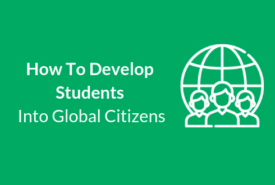
Since the COVID-19 outbreak across the globe took hold in February 2020, study abroad programs rapidly organized flights home for their students while universities scrambled to get online classes in place almost instantaneously. Maymester and Summer 2020 programs have been almost entirely canceled or shifted to new virtual opportunities. As governments and organizations alike adjust to our new normal, those of us who work in study abroad can’t help but look to the future and have a flurry of questions about the future of the field.
The field of international education is full of passionate individuals who strongly believe in the impact that travel and exposure to different countries and cultures have on students and their development. With Fall 2020 programs in limbo, providers and universities are doing their best to create flexible options to keep students’ dreams of study abroad alive.
Over the last two-plus months, we’ve seen a number of questions consistently arising on education abroad professional message groups and online resources. We’ve compiled the five biggest questions regarding study abroad for Fall 2020 and beyond, along with our thoughts on the situation.
As the COVID-19 situation is constantly evolving, this post will be updated on an ongoing basis.
1) What will change about study abroad?
For Fall 2020 programs, we have seen several of the semester programs operating in Europe have pushed back their start date in order to eliminate the need for study visas for students. By reducing the number of in-country days to less than 90, these programs and universities have eliminated the potential barrier of students obtaining visas in time for their program start in September. Most programs have not yet released their plans for Spring 2021 and beyond.
Another consideration for study abroad is new travel regulations that will impact programs that are traveling with groups of their students or the students themselves who are traveling independently while abroad. Will there be fewer transportation options due to social distancing guidelines? What will programs require of their students who travel independently upon their return to class? These questions remain unanswered, but organizations are preparing in advance for a multitude of scenarios that can be implemented upon the release of guidelines from the US and local governments.
2) Will as many students study abroad?
The Fall 2020 semester, if able to operate, will be looking at a largely reduced number of student participants. This number will be dependent on students’ home institutions allowing them to go abroad and these universities will make their decisions based on the US State Department travel warnings as well as local policies within the study abroad destination.
According to a survey conducted by QS, at the end of March 2020, nearly two-thirds (65%) of students responded that they were planning to delay their study abroad experience. This data shows that a large number of students who have the desire to study abroad, still wish to complete their program even if they will need to delay when that takes place due to COVID-19.
3) What new risk management procedures will be in place?
While all viable study abroad providers and support programs will need to abide by US and local regulations for social distancing and safety going forward, it’s also safe to say that they will likely be implementing their own internal processes and risk management protocols in place for COVID-19 and in the case of another situation similar to what happened during this past Spring 2020 regarding students returning abruptly from abroad.
Some of these procedures may include:
- Reduced number of students in student housing
- Reduced class sizes
- Required private travel insurance
- Additional sanitation in community spaces
4) How can I assist my students and faculty whose plans were altered due to COVID-19?
For some universities, they have made the difficult decision to suspend all study abroad programs of all lengths until 2021, but others are still keeping the door open for the potential for Fall 2020. If you have students that were studying abroad in Spring 2020 or had plans to study abroad in Summer or Fall 2020, encourage students to postpone rather than cancel their study abroad plans if possible. If a semester program is not possible for them, encourage them to seek out faculty-led or short-term study programs during the 2021 year.
For faculty members, whose May or Summer 2020 program was canceled try to prioritize these programs for the following year or reimagine them for a Fall or Spring break model. If your office is able to shift focus to 2021 programs, we recommend beginning the planning process as soon as you can to ensure sufficient time for program development, approval, and student recruitment.
5) How can we encourage study abroad participation going forward?
While there has been a large impact on international education, its important to consider the larger global impact as well. Financially, many students and their families may be struggling. If your university or college is able to offer short-term programs that are more accessible for students on a budget, you may be able to provide an opportunity for students who otherwise would be unable to make their study abroad dreams a reality.
Additionally, continuously provide your students with up to date information so they can make the best decision possible for their unique situation.
Bonus Question: Will study abroad bounce back?
We believe that students will always have a desire to travel, learn, and grow through study abroad programming, but what that will look like in the near future might be different from what it has looked like historically. 4.0 Tours looks forward to continuing our mission to help more students have impactful experiences abroad for the years to come.
International Education
How To Develop Students Into Global Citizens

Ready or not, the future is a globalized one. How are you preparing your students for this shift?
We’ve laid out three actionable steps to assist you in developing your students into global citizens and set them up for future success.

